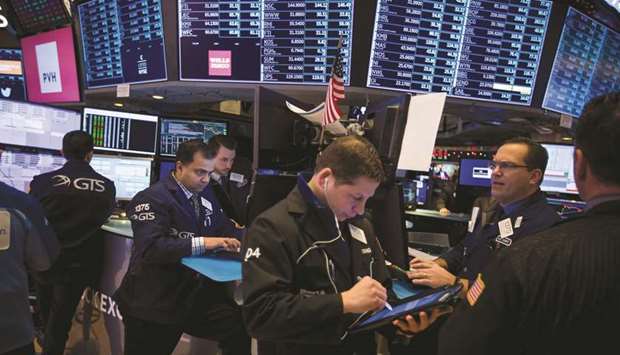The worsening trade war is driving the steepest sell-off in Chinese shares traded in the US since the global financial crisis.
The S&P/BNY Mellon China ADR Index has plunged 15% in May, putting it on track for its worst monthly performance since October 2008.
Social media firm Weibo Corp, online media company Sina Corp and Internet search firm Baidu Inc have all declined more than 30%.
Losses aren’t confined to the US - in Hong Kong, the Hang Seng China Enterprises Index of Chinese firms is down almost 10%, the worst performance among major global benchmarks.
The scale of the rout shows how tainted Chinese assets have become since the Trump administration stepped up pressure against Beijing this month by imposing tariffs and taking steps to limit the country’s access to key technologies. Just three weeks ago the S&P/BNY Mellon’s ADR index was nearing a nine-month high, while the Shanghai benchmark’s first-quarter rally was its best start to a year in a decade.
The timing of the slump is bad news for investors who track MSCI Inc’s global benchmarks.
The index compiler is increasing weightings of Chinese mainland-listed companies in its gauges, which are already heavily dominated by overseas-traded Chinese firms. Chinese companies have contributed to more than a quarter of this month’s declines on the MSCI Emerging Markets Index, led by Tencent Holdings.
A slumping yuan is adding to investor pain by reducing the value of Chinese company earnings when converted into dollars. The onshore Chinese currency is down 2.5% this month, while the offshore rate is off 2.6%.
“What’s coming next on the trade front is the key. With Trump shifting views, it’s not going to be easy for both parties to reach an agreement,” said Ronald Wan, chief executive of Partners Capital International Ltd “Unless there’s a surprisingly good result, the pessimism is here to stay.” There is so far little sign that things will get better quickly. China blamed Washington for wrecking trade talks and insisted the US must alter its “wrong practices” before negotiations can resume.
“China’s stance on the talks has been clear - if the US wants to resume talks, they should show sincerity and correct their wrong practices,” ministry spokesman Gao Feng said in Beijing on Thursday.
The same day, President Donald Trump described China’s Huawei Technologies Co as “very dangerous,” even as he said it could be included in some kind of trade deal with Beijing. His administration also proposed tariffs on goods from countries found to have undervalued currencies, which could broaden Trump’s trade salvos.
The Hang Seng China gauge is on track for its worst monthly drop since January 2016, with selling momentum at its most intense in 11 months on Thursday. The biggest laggards are China Tower Corp Ltd - a key player in the country’s next-generation telecom networks - and Air China, both down more than 20% in May. The race for 5G supremacy has also been a contentious factor in China’s relationship with the US.
Though some parts of the market look to be oversold, traders are expected to remain on the sidelines and await developments on trade when Trump and Xi Jinping meet at the G20 meeting in June, according to Alvin Cheung, an associate director with Prudential Brokerage Ltd
“Investors aren’t going to buy the dip before Xi and Trump meet next month,” Cheung said. “That would be a gamble. People care more about preserving cash right now - it’s not a time to bottom fish even if some stocks look oversold.”

Traders work on the floor of the New York Stock Exchange (file). The worsening trade war is driving the steepest sell-off in Chinese shares traded in the US since the global financial crisis.
